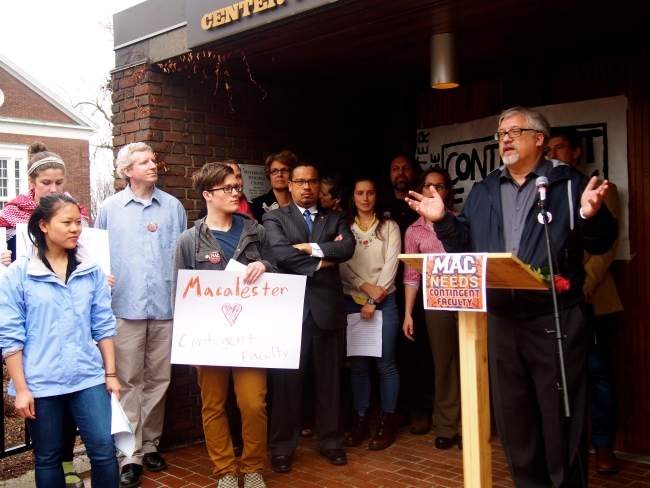You have /5 articles left.
Sign up for a free account or log in.

Macalester College adjuncts campaign for an SEIU union earlier this year.
SEIU
The Service Employee International Union’s adjunct organizing drive seemed for a time to be on cruise control, with “yes” votes for unions at more than a dozen campuses from Washington to Los Angeles since 2012. SEIU’s Adjunct Action campaign did hit a speed bump at one institution outside Boston – Bentley University – but the union defeat there last year was by a narrow margin, and many onlookers chalked it up to Bentley’s unique business focus. The campaign quickly returned to speed in that city, with successful union drives at Lesley and Northeastern Universities (in addition to Tufts University), and others across the country.
Then the campaign hit the Twin Cities. Adjuncts at Hamline University in June overwhelmingly voted to form a union, but elsewhere there have been two major roadblocks: a canceled vote at St. Paul's Macalester College last month amid calls by many adjuncts to slow down, and a decisive defeat just this week at the University of St. Thomas, in Minneapolis.
Accounts from adjunct professors on both sides of the vote at both institutions detail persuasive outreach from the colleges’ administrations – neither of which formally challenged their adjuncts’ legal right to form a union – and a failure on the part of SEIU to quickly convince adjuncts that unionization was their best chance at gaining better working conditions.
“One of the underlying problems that adjuncts have is not feeling a part of the team, of not feeling respected,” said Kim Sovell, an adjunct professor of business at St. Thomas who led the fight against the union drive on that campus. “But a union can’t get you that respect – it can’t be negotiated into a contract. It has to be earned.”
With that message and the mantra “think critically, act wisely” (taken from the Roman Catholic university’s mission statement), Sovell and a few colleagues launched a vigorous email campaign against the union in the three weeks leading up the vote. Their efforts supplemented outreach in faculty forums and emails from the university’s president of one year, Julie Sullivan.
Sullivan could have objected to the union on religious grounds, arguing that St. Thomas is outside of the jurisdiction of the National Labor Relations Board, as other institutions such as Pacific Lutheran University and Seattle University have done. While those cases are still being appealed, raising the religious issue has put unions for adjuncts on hold at institutions that have invoked their religious status. Instead, Sullivan appealed to adjunct faculty members on a personal level.
Sullivan’s message, typified in an open letter to faculty members on the eve of the vote, was clear: “I have publicly stated on numerous occasions that I am committed to addressing the needs of adjunct faculty at the University of St. Thomas without the involvement of a union. How can you be sure I will fulfill this commitment if there is a ‘no’ vote? It boils down to one word: Trust.”
The president’s letter continues: “I trust you, and I ask only that you trust me -- to live up to my words and to work with you. I will because I believe it is the right thing to do. I will because my reputation is on the line. I will not risk losing my credibility with you, as well as with our full-time faculty and our Board of Trustees, by doing anything else. I report to the board, and it supports my commitment to you.”
The results of those efforts, announced Monday, also were clear: 136 opposed to the union and 84 in favor, of about 300 eligible part-time faculty members.
Sovell attributed the “win” to having a “sensible argument that resonated.” By contrast, she said, SEIU’s outreach was “muddled,” overemphasizing the fact that the university had retained a labor attorney instead of focusing exclusively on educational concerns.
Such rhetoric highlighted the fact that SEIU was a relatively new player among education unions and made some faculty wary of “hitching their wagons” to it, Sovell said.
Still, many faculty members were enthusiastic supporters of the proposed union. An adjunct faculty member in the humanities, who did not want to be identified by name for fear of possibly losing his position, said many of his colleagues were relying on the union for improved pay and the possibility of benefits – even ones as small as using on-campus exercise facilities. St. Thomas only recently extended this privilege to adjuncts.
"Little things mean a lot” in the lives of adjuncts, many of whom struggle to string together work at various institutions to make a living on a semester-to-semester basis, the adjunct said. Still, he noted that working at St. Thomas – where he enjoys a shared office and where average per-course pay for adjuncts is $4,300 (significantly higher than the national average) – was far more comfortable than at other institutions where he'd been a faculty member.
The St. Thomas adjunct voted for the union, but said he was “on the fence” leading up to the vote due to some persuasive arguments from the administration – and not just Sullivan.
He cited an email from Terence Langan, dean of the College of Arts and Sciences, who compared the union drive – in what the dean acknowledged was an imperfect metaphor – to a game of cards.
“I think, collectively, the adjunct faculty at UST are holding two cards,” Langan’s email says. “Card #1 involves working directly with our new president, Dr. Julie Sullivan, to try to improve the conditions of employment for adjunct faculty at UST. Card #2 involves immediate unionization by the adjunct faculty through SEIU, or another union, and working toward a collective bargaining agreement. If you play card #2 first you must discard #1 and you are out of cards, though you are now represented by a union. If you play card #1 first you continue to hold card #2 should you need it, and you can play it as soon as a year from now (or possibly even six months from now) with SEIU or another union.”
Ultimately, the adjunct said he was somewhat disappointed by the outcome of the vote, but not too surprised. He hoped that Langan’s implicit promise that playing “Card No. 1” would lead to better conditions for adjuncts would not be empty.
The university says it’s not. A $200 per course pay raise is on the way. But even Sovell wants more, and plans to hold Sullivan “accountable” to adjuncts’ needs and concerns going forward.
The story at Macalester is somewhat similar (Sovell says she asked SEIU to withdraw the vote at St. Thomas, to no avail.) In letters to faculty members, President Brian Rosenberg said he was not opposing the drive and respected the labor process.
Despite that, he said in a May memo, “we believe that it is not the right direction for any of our faculty members, will not strengthen our institution or our governance structure, will not help the faculty who are directly involved, and will not assist our students in any way.”
In an open letter published later in the month in Macalester’s student newspaper, The Mac Weekly, seven adjunct faculty members expressed concerns about the swiftness of the process, once a vote date was announced, and confusion about what they stood to gain by being members of a union.
“We are all academics, after all, a group of people who are notorious for doing research,” the letter says. “Though we’ve been scrambling to gather information since we learned about the imminent vote, we still lack a clear understanding of what it would mean to have a union represent us. In addition, because the short time frame of this vote came as a surprise to most of us, the unionization effort feels like something being forced upon us rather than something that came from us.”
Several weeks later, just before the vote, SEIU withdrew its petition for an election from the NLRB. The organizing committee explained its reasons for the move in an email to adjunct faculty members.
“After speaking and listening to dozens of our contingent colleagues, it has become clear that many on both sides of the issue believe that more time is necessary to consider this decision,” the email says. “There is also consensus that the public conversation should include a fuller spectrum of voices than are currently represented. For these reasons, we have decided to delay our election.”
The news came as a relief to many faculty members, but others still – including Brendan Miller, an adjunct professor of physics – were disappointed. He rejected the idea that SEIU had forced an election on adjuncts who simply weren’t ready for it. (Although a vote date was announced within weeks of the vote at both St. Thomas and planned vote at Macalester, union drives were active on both campuses for a semester.)
“I enjoyed working with SEIU and I strongly support their Adjunct Action campaign,” he said via email. “We on the organizing committee called the shots at Macalester and we had many productive discussions with our colleagues covering what we love about working here and what we would like to see improved. I wouldn't interpret pulling the petition at Macalester as a rejection of the unionization message -- the vote would have been close, and everyone agreed it would be better to continue the discussion at greater length, and with wider participation.”
Minnesota-based SEIU organizers did not immediately return a request for comment. But many adjuncts at colleges that already have collective bargaining agreements with the union say that they've seen improved pay and working conditions as a result.
Elsewhere, adjuncts and full-time non-tenure-track professors at Antioch University’s Seattle campus are expected to announce the results of their SEIU vote today. Similar to her counterparts at Macalester and St. Thomas, Antioch Chancellor Felice Nudelman has not opposed the vote. But she’s said in conversations with faculty members and in an interview with Inside Higher Ed that the college's ability to solve problems creatively and collaboratively could be diminished by the formation of a union. Nudelman has also voiced concern about full-time faculty members' voices in governance being diminished by the proposed union structure (Antioch does not have tenured professors, and all faculty members have elected to be part of the proposed bargaining unit).









